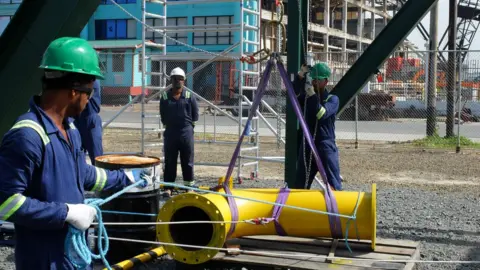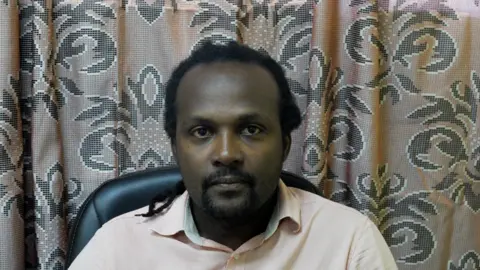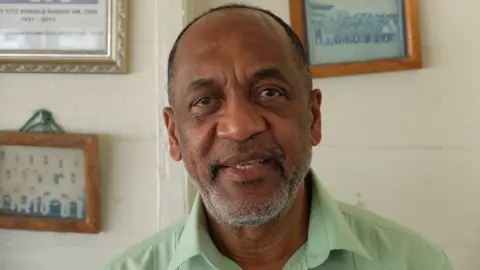Will Guyana soon be the richest country in the world?
 BBC
BBCSouth America's second poorest nation is bracing for an oil boom that could catapult it to the top of the continent's rich list - and beyond. But can Guyana avoid the so-called oil curse and ensure that its newfound riches benefit all Guyanese?
"Many people still do not get how big this is," then-US Ambassador to Guyana Perry Holloway told a reception in the capital, Georgetown, last November.
"Come 2025, GDP will go up by 300% to 1,000%. This is gigantic. You will be the richest country in the hemisphere and potentially the richest country in the world."
It may sound far-fetched, but with a population of around 750,000, in per capita terms, Guyana's wealth is set to skyrocket. ExxonMobil, the main operator in Guyana, says it has discovered more than 5.5 billion barrels' worth of oil beneath the country's waters in the Atlantic Ocean.
'Oil curse'
The money would certainly be welcome. This former British colony - the only English-speaking country in South America - has high rates of unemployment and poverty.
But history carries a warning for Guyana. The discovery of big oil in other developing nations has exacerbated existing corruption, leading to the new oil wealth being squandered and stolen. It has become known as the oil curse.

You may also be interested in:

In Guyana, "corruption is rampant," says Troy Thomas, the head of the local chapter of global anti-corruption NGO Transparency International. He says he is "very worried" about the oil curse. A political crisis in recent months has been seen by some as an early sign of the curse's effects.

After the governing coalition lost a no-confidence vote in December, rather than call elections it challenged the vote in the courts.
That has led to protests.
"All we're asking for is for the government to respect our constitution," a demonstrator tells me, standing on the road outside Guyana's ministry of the presidency. "They just want to remain in power and control the oil money," she adds.
The legal battle has continued and this week the Caribbean Court of Justice is hearing the latest appeal in the case.
Betting on education
"We've seen the experiences in other countries," says Vincent Adams, the new head of Guyana's Environmental Protection Agency, who worked for three decades at the US Department of Energy. "They got all this oil wealth and a lot of those countries are now worse off than before oil."

For Mr Adams, there is one key to avoiding that trap: "Education, education, education is the foundation. It's the best investment that this country or any country can make."
He is leading a push to revamp the faculty of engineering at the University of Guyana, the country's biggest higher education provider. But preparing young Guyanese for the lucrative new industry has not been straightforward.
"Unfortunately for us, we don't have right now labs for a petroleum engineering programme," says Elena Trim, the dean of the faculty.
It has also been a challenge attracting academic talent with the relevant expertise.
"Our salaries are not that high," she says with an ironic chuckle. "So people are applying to the University of Guyana and when we tell them our salary level, they actually don't want to take the offer."
Nonetheless, even at this early stage, Guyana's oil industry has already been taking on the faculty's graduates from other engineering specialisms. Two years ago, 10 were given jobs. Last year, the same company asked for 20 more.
"Now they [are] taking our students like hotcakes," says Ms Trim.
Scepticism abounds
In Sophia, one of Georgetown's poorest neighbourhoods, there is less optimism. Some of the self-built houses and shacks only got access to electricity and running water this century.
"Quite frankly, in this community, it's close to 10% of the city's population who live here, but 10% of the city's resources are not being spent in here," Colin Marks tells me at the youth centre he set up.

That helps to explain the scepticism about how far the benefits of oil will spread.
"Most people are sensitive to it. Because there's more negativity on what it could do for Guyana than positivity. And that's happening because what is happening at the political level. I mean, you're hearing about what happened in Guinea, what happened in Nigeria - Venezuela's next door, you know. So people are very, very sensitive, and not too sure."
"In a grassroots community like this, people just want know that if there is money in oil, we want a share of it. We want to benefit from it."
